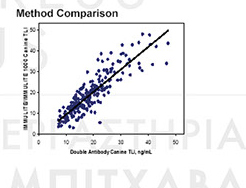In our continuous effort to answer in all your diagnostic demands with reliability and immediacy, we have applied the serum trypsin like immunoreactivity technique for TLI measurement in dog serum. It is the most up-to-date technique with reagents exclusively designed for it. The determination of TLI in cat serum will be possible in a very short period, when the evaluation has finished. The comparison of the specific technique with RIA is listed below.
«TLI test is a reliable diagnostic method not only for the determination of exocrine pancreatic insufficiency (EPA) but also for severe pancreatitis in dogs».
«Dog and cat’s gastroenterology», T Rallis 2nd edition 2006 University Studio Press
TLI test is a reliable diagnostic method for the determination of exocrine pancreatic insufficiency (EPA) and also for severe pancreatitis in dogs. Trypsin and trypsinogen are detected in blood serum with radioimmunoassay. Low TLI levels suggest a decrease in pancreatic mass and in EPI. On the contrary, high TLI level is associated with an increase in trypsin in blood and also with acute pancreatitis.
Normal TLI values in dogs range between 5-35mg/L. Values lower than 3mg/L indicate EPI, while values higher than 35 µg/L indicate severe pancreatis. Values between 3-5 µg/L indicate EPI and the test is repeated after 20 days. Blood collection should take place in 12 hours fasted animals. Although TLI test is the most common technique of EPI diagnosis in dogs, its results are not always the expected ones for a small number of sick animals. More specific, its values are higher than 5 µg/L.
This fact either suggests simultaneous EPI and blain presence in healthy pancreatic tissue or failure of the technique.
For those few incidents, a new trial has been recently suggested which is based on the stimulation of exocrine pancreas
from secretine and cholecystokin pancreozymin assessing the response concerning the enzyme secretion. However, this application is still limited.
TLI test is also used in feline. Their normal values range between 17-50 ug/L in blood serum. Values lower than 8 ug/L are considered as characteristic if EPI.
Concluding, TLI is a simple, specific diagnostic method which can be used in patients suffering from EPI by providing porcine or bovine pancreatic enzymes, without stopping the treatment (Rallis, 2006).
CHARACTERISTICS OF THE DIAGNOSTIC TESTS
TLI test detects simultaneously trypsinogen and trypsin levels in serum. Trypsinogen is produced and secreted only by pancreatic acinar cells. As it is known, enterokinase cleaves the trypsinogen into trypsin, which is the active enzyme.
Low quantity of trypsinogen is released into the blood stream and consists a normal blood component. On the contrary. trypsin is detected in serum only in cases of pancreatic blain.
SAMPLE TREATMENT
• Serum is needed for the following technique.
• The patient should be examined after twelve hours fast.
• Studies have shown that TLI is very stable in serum up to 7 days in frozen samples, while in -20 oC it remains stable up to 2 months.
• As TLI reagent is specific for dogs’ use, it is not affected from simultaneous pancreatic enzyme supplementation. The reason is that most supplies in the market are from porcine and bovine origin and cannot be traced by the specific technique.
• Studies have shown that in cases of severe pancreatitis, TLI concentration in dogs and cats serum raises up to 20 times higher than the normal values, something that makes it a crucial diagnostic. However, this rise lasts for a short time (usually 3-4 days). So sampling must take place as soon as possible after the clinical signs.
• In the case of pancreatic insufficiency, TLI values may be affected. Studies have shown that creatinine concentration higher than 5 mg/dL and 4 mg/dL in dogs and cats respectively, might double TLI levels.
The evaluation of B12 and folic acid is strongly recommended because the results may indicate a coexistent or individual infection of the small intestine. Moreover the insufficiency of these vitamins should be eliminated in order to have a better therapeutic result for EPL.
- Laboratories:
- Vet in Progress Plus
- Service :
- Endocrinology
- Category:
- TLI Test


